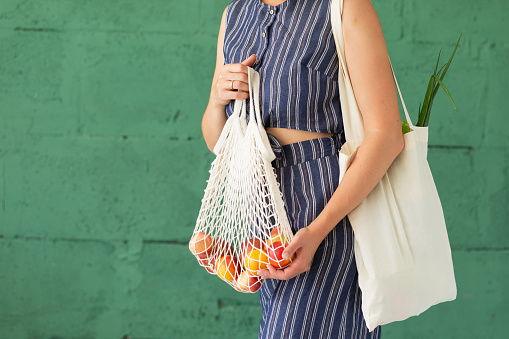
Stylish women would not be fashionable for long if they did not care about the environment and the quantity of waste they produce. As a result, cloth bags in Dubai have become a popular fashion accessory. Carrying plastic grocery bags home is also unfashionable, not to mention uncomfortable to carry. So, for a variety of reasons, women who care choose organic cotton tote bags as reusable grocery bags.
Organic cloth bags are durable
Cotton tote bags can withstand any situation. They’re sturdy, so you can keep anything in them, even if it’s heavy or oddly shaped. The cotton tote bag can conveniently transport everything she purchases from the market to the refrigerator. The handles of the bags can be long enough to be used as a shoulder bag, or they can be comfortable enough to be held by hand without cutting into the skin.
Use the cloth bag for anything
Cotton tote bags are the current item of choice for anyone who cares about fashion since they come in a variety of sizes and can be used for a variety of reasons. Use a tote bag as a handbag, a book bag, or anything else you need to keep on hand all the time. A cotton tote bag is an ideal carry-along no matter where she is heading.
Goes with any outfit
Cotton tote bags are comfortable and well-made, with superior stitching and a fashionable design. They are also a neutral colour, so they do not stand out.
Available all the time
A cotton tote bag is readily washed and dried, and it is reusable. That means they may be kept in the car or at the front entrance, ready to be picked up and utilised for anything. The ability to wash it, quickly dry it, and return it to its original form without ironing or fussing is a significant reason why they are the best choice for elegant ladies who care.
Why cloth bags are better than plastic bags?
Cloth bags outperform plastic bags for several reasons. Mostly because of these two factors. To begin with, cloth bags are reusable, which reduces the need to utilise more resources for single-use manufacturing. Second, cloth bags reduce plastic usage and, as a result, plastic pollution.
Cloth bags are reusable bags made of cloth rather than HDPE (High-Density Polyethylene) plastic. Natural fibre totes, recycled reusables, backpacks, and even up-cycled DIY bags are all examples.
While it is true that making a single-use HDPE plastic bag uses significantly less energy and materials than making a reusable bag. However, the vast amount of plastic bags overwhelms natural resources.
For example, each year, we use 500 billion bags worldwide. And each of those bags requires a significant quantity of natural gas and crude oil. Cleaning up and removing these plastic bags costs a lot of money and resources.
The advantages of cloth bags are augmented by their environmental effect. A cotton bag may need up to 170 uses to reach the “break-even” point (the number of times a bag must be used to offset its manufacturing impact). Many reusable cotton bags, on the other hand, are now made from recycled materials. These reusable, recycled totes transform otherwise discarded plastic rubbish into long-lasting, strong fabric bags that may be used for years to come.
Types of cloth bags and their eco-friendliness
There are two sorts of reusable cloth bags to select from: natural and synthetic.
Natural fibres, such as jute, hemp, and cotton, are especially environmentally benign since they biodegrade after usage. Jute and hemp are low-cost plants to grow and harvest, making them excellent for raw material gathering. Cotton takes a lot of water to make, therefore it’s a little more expensive than other choices.
Cotton and jute are natural plant fibres that are grown, harvested, and processed into fabric. This cycle is repeated, and as the reusable bags wear out, they may be recycled or even composted due to the fabric’s biodegradability. Sustainable plants convert carbon dioxide, a greenhouse gas, into breathing oxygen throughout the growing process, making them long-lasting materials green in every aspect.
Polypropylene, regenerated PET, and polyester are just a few of the synthetic fibre bags available. Because they need less energy to manufacture, recycled bags are by far the most environmentally friendly and sustainable solution. They are reusing waste plastic that would otherwise end up in landfills. Furthermore, polypropylene bags only need to be used 14 times before they become more ecologically friendly than HDPE bags. The breakeven consumption figure for recycled bags might be less than two.
